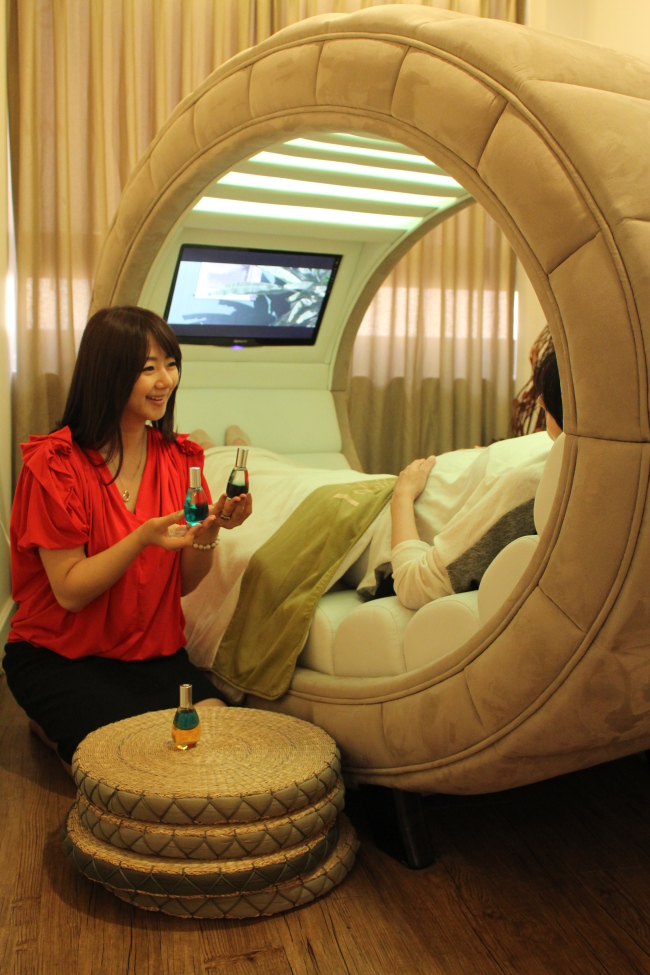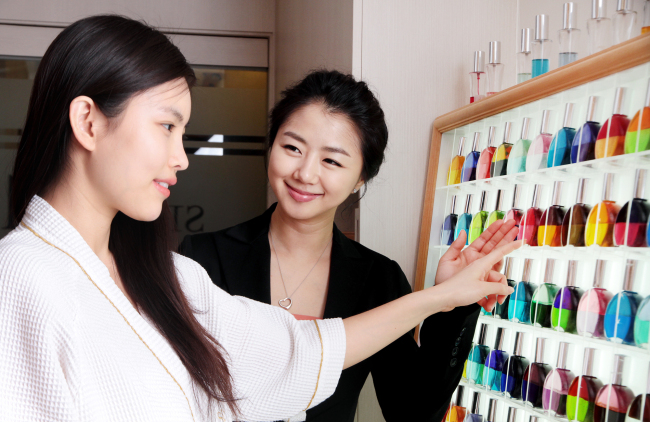When Lee Mi-na opened her spa, “SPA THE EL” in southern Seoul in 2011, she had one goal. On top of facials and body massages, the former TV personality wanted to offer treatments for the mind.
The spa specializes in special services such as color therapy and counseling, which aid in improving mood and reducing the risk of depression.
Lee, who spent many years in the television industry, says she was severely depressed in high school.
“I am the kind of person who cares about what others think about me,” Lee told The Korea Herald in her office.
“What really bothered me was how people judged me based on my grades at school. And I really didn’t think my grades said much about who I was.”
Lee remembered drinking a lot and wandering around the streets alone to fight the mood. But she only started feeling better about herself when her mother hired a new, caring tutor for her.
“After helping me with my studies, she would make sure she and I spent some time talking,” said Lee, who now counsels her clients on their personal problems and traumas. “And she would really just listen to what I had to say. Having someone who listened to me made a huge difference in my life.”
Even when she was working as a TV personality, Lee always thought of doing something for people who struggle with confidence issues or depression. Her mother also suffered menopause depression, she says.
Lee and her mother are not alone. According to a recent report released by the Seoul Metropolitan Government, virtually all Seoul residents, regardless of age and gender, are suffering from mild depression.
Symptoms of depression include loss of interest in daily activities, either insomnia or oversleeping, self-loathing, and significant weight loss and weight gain.
At Lee’s spa, one can learn more about one’s subconscious mind by choosing three different colors. Each color has its own significance. For example, red is linked to energy, white to spirituality, and orange to relationships. Each chosen color may represent what you subconsciously want or need, as well as what you subconsciously like or dislike. Then one is asked to draw circles, triangles and squares, which also give information about one’s state of mind.
Once, a married woman came to the spa saying she wanted a divorce. She had moved to the U.S. after marriage, and she found it difficult to make friends in a foreign country. She stayed home while her husband was mostly busy at work, not understanding why his wife was unhappy.
“What more do you want?” he would often say.
“The first step is really learning about who you are,” said Lee. “She wasn’t aware that she is the kind of person who needs constant assurance. Her husband, on the other hand, was someone who isn’t used to expressing his feelings all the time. Once she became aware of what her needs were, it became much easier for her to understand the problems between her and her husband.”
Dr. An Hui-jean, a professional therapist who runs The Eshel Tree Counseling Center in Seoul, says more than 50 percent of the people who come to her say they are “feeling depressed.”
An explains that depression is almost like a set of belief systems. One of her clients, a young woman in her 20s, quit her job after her boss told her, “I’ve never met anyone who is as quiet as you are.”
Her train of thought was: My boss thinks I’m quiet. Everyone, including myself, dislikes quiet people. Hence everyone in this office will eventually dislike me. And that will lead me to get fired. Therefore, I should quit before that happens.
“After hearing that sentence, she automatically thought she’d eventually get fired,” An explained. “When you are depressed, you automatically think of the worst possible outcomes. You firmly believe that the worst will happen, and it is very hard to get out of that (belief system).”
An says for many, their depression has to do with childhood experiences with those who raised them. It can be their parents, or other authority figures such as school teachers.
Another client, Kim (not her real name), was an office worker in her 20s. She was raised by very strict parents, who rarely complimented her and usually told her she needed to and could do better. When she first got a job, she tried very hard to please everyone in the office, the way she tried to please her parents when she was a child. Whenever a superior complained about her workload, the young woman “took it as a hint” and offered to do it for her. She often voluntarily gave up her weekends. She thought doing so was her “duty” as the newest addition to the company.
However, things changed when another new employee, Lee (not her real name), joined the company. Unlike Kim, Lee did not offer to do more work and never volunteered stay late. To Kim’s surprise, people in the office liked Lee and were generous about her mistakes. Kim gradually became depressed and angry, and began to think that “everyone likes the new girl and is lenient toward her because she is pretty” and she has to work three times as hard because she “is ugly and no one will like her if she can’t at least do her work properly.” Whenever she was alone, Kim found herself sobbing, overwhelmed by anger and resentment.
“Kim was not ugly at all,” An said. “When a child is not fully convinced that she is loved unconditionally by her parents, they tend to grow up as someone who is very much achievement-oriented. They are easily terrified of failures, and tend to think they are worthless if they are not good at what they are expected to do.”
Counseling is, according to An, very much like having an argument or a debate.
“I keep challenging them,” she said. “I ask questions like, ‘How can you prove that everyone hates you?’ or ‘what could possibly have happened if you did not offer help when your superior complained?’ And hopefully and gradually you realize that your set of belief systems and its logic in fact don’t make sense.”
An says most relationship problems, especially in Korea, stem from “not being able to say no.”
“It is like managing your own house,” she says. “You open it and invite others when you want to, and you close it when you want it to be closed. You can’t always keep it open, and you can’t always keep it closed, either. It requires knowing your limits, responsibilities, rights and belongings. When you want to and can help someone, do it with your best effort. When you can’t for a legitimate reason, don’t be afraid to say no.”
Here are some books, movies and music jointly recommended by the Seoul Metropolitan Government and National Evidence-based Healthcare Collaborating Agency that ease anxiety and depression.
Movies, books and music:
Here are some books, movies and music jointly recommended by the Seoul Metropolitan Government
and National Evidence-based Healthcare Collaborating Agency that ease anxiety and depression.
Music:
Piano Concerto No. 5 in E Flat Major, Op.73 3rd, Movement by Ludwig van Beethoven
Brandenburg Concerto No. 4 in G Major, BWV 1049, 1st Movement by Johann Sebastian Bach
Kol Nidrei by Max Bruch
Piano Concerto No. 2 in C Minor, Op. 18, 2nd Movement by Sergei Rachmaninov
Reflets dans l’Eau by Claude Debussy
Liebestraume No. 3 by Franz Liszt
Books:
“Eat, Pray, Love” by Elizabeth Gilbert
“The Healing Code” by Alexander Loyd, Ph.D.
“Your Erroneous Zones” by Wayne Dyer
“The Power of Now” by Eckhart Tolle
Movies:
“Don’t Cry for Me Sudan” (2010) (Korea)
“The Bucket List” (2007) (U.S.)
“The Beaver” (2011) (U.S.)
“Josee, The Tiger and the Fish” (2003) (Japan)
“Morning Glory” (2010) (U.S.)
By Claire Lee (
dyc@heraldcorp.com)









